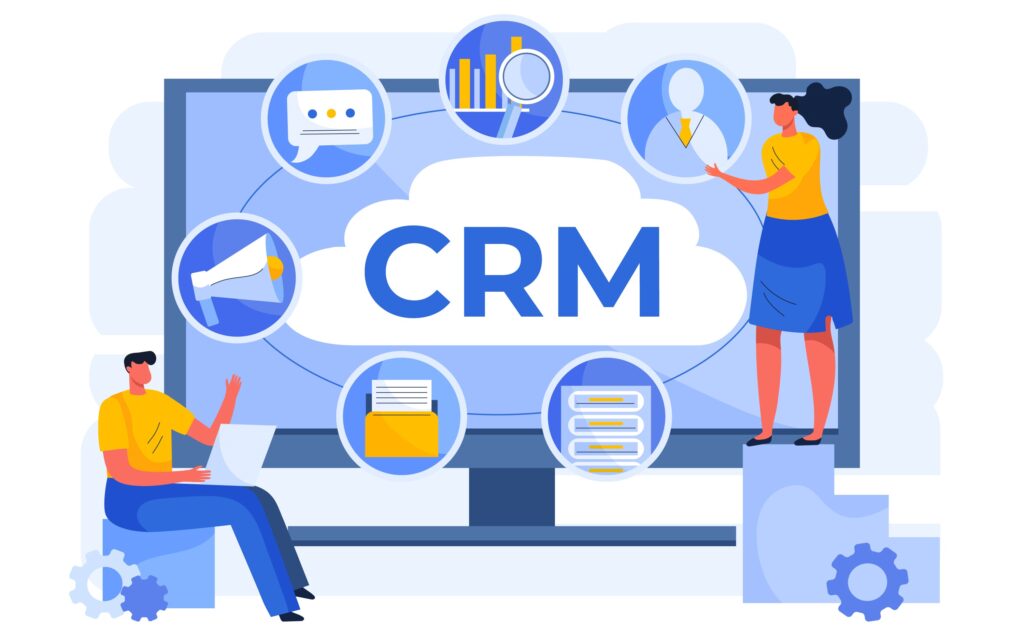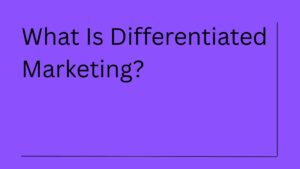Customer Relationship Management (CRM) software is a powerful tool that has revolutionized the way businesses interact with their customers. But what does it have to do with marketing is the question?
A lot of people still think that CRM is exclusively about managing sales processes. This perception comes from the early days when CRM systems were primarily designed for sales teams to track leads and close deals. This, however, is an outdated opinion to have.
Today, when businesses are required to align their sales and marketing departments perfectly if they want to stay afloat and succeed, CRM enters the world of marketing, too. Modern marketing requires sophisticated data management, personalized customer experiences, and seamless handoffs between marketing and sales teams. Without proper CRM integration, marketing efforts often fall short of their potential impact.
Understanding What is CRM in Digital Marketing and Its Role
In marketing, CRM (Customer Relationship Management) refers to the strategies, tools, and technologies used to manage and analyze customer interactions and data throughout the customer lifecycle. This definition encompasses not just the software itself, but the entire approach to organizing customer relationships in a way that drives marketing effectiveness. The goal of CRM in marketing is to improve customer relationships, increase customer loyalty, and ultimately drive sales and profitability through data-driven insights and personalized experiences.
Modern CRM systems serve as the central hub for all customer-related information, enabling marketing teams to make informed decisions based on comprehensive customer data rather than assumptions or incomplete information.
Core Components of CRM in Marketing
A CRM system in marketing typically includes a database of customer and prospect information, such as contact details, purchase history, and interactions with the business. This database goes far beyond basic contact management to include behavioral data, preference tracking, communication history, and predictive analytics that help forecast future customer actions.
It also includes tools for managing customer interactions, such as email marketing, social media management, and customer service management. These integrated tools ensure that all customer touchpoints are coordinated and contribute to a unified customer experience. The system tracks how customers interact with your brand across multiple channels and provides insights into which marketing efforts are most effective for different customer segments.
How CRM Software Transforms Marketing Activities?
Here are a couple of ways in which CRM software can help with marketing activities and streamline a huge part of marketing tasks:
Customer Journey Visibility and Pipeline Management
CRM software allows you to see a detailed history of a customer’s journey, including the point where they entered the sales pipeline and where they currently are in it. This visibility extends beyond basic contact information to include website behavior, content engagement, email interactions, and social media activity. This way, you better understand the pain points of your leads, as well as what interests them and motivates their purchasing decisions.
Sales enablements for top-of-the-funnel leads are very different from those for the bottom-of-the-funnel ones. Top-funnel prospects need educational content, awareness-building materials, and trust-establishing resources. Bottom-funnel leads require product comparisons, pricing information, case studies, and decision-making tools. Having a CRM system that provides its users with an opportunity to craft visualized sales pipelines and know exactly where each and every lead is makes marketing personalization more accessible and allows businesses to better target their audiences with the right message at the right time.
Complete Communication History and Customer Context
You get access to the full history of communication between you and your customers or leads. This includes every email exchange, phone call summary, meeting notes, support ticket, and interaction across all touchpoints. This comprehensive view eliminates the frustration of repeated conversations and ensures continuity in customer relationships.
This is extremely useful for user experience. You need to understand that the more you know and remember about your potential customers, the more likely you are to convert them into actual customers. When marketing teams can reference previous conversations, understand customer preferences, and acknowledge past interactions, they create a sense of continuity that builds trust. There’s this little something about being treated like a treasure, and having your full and undivided attention contributes to this feeling. Customers notice when businesses remember their specific needs, preferences, and previous concerns.
Integrated Email Marketing Capabilities
A lot of advanced CRM tools offer email marketing functionality. This integration eliminates the need for separate email marketing platforms and ensures that all customer data remains synchronized across your marketing efforts. For instance, NetHunt CRM has email tracking capabilities, an option for bulk emailing, allows you to save and use email templates, and provides detailed analytics on email performance, including open rates, click-through rates, and conversion tracking.
These built-in email features enable marketing teams to create highly targeted campaigns based on CRM data, automatically segment audiences based on customer behavior and pipeline stage, and trigger personalized email sequences based on specific actions or milestones.
Marketing Automation and Lead Nurturing
It has marketing automation functionality. Great CRM systems offer an opportunity to set up advanced and multifaceted email sequences for you to nurture leads and move them further down the sales funnel. These automation capabilities extend beyond simple email sequences to include behavioral triggers, scoring systems, and multi-channel campaigns.
Marketing automation within CRM platforms allows you to create sophisticated drip campaigns that respond to customer actions, automatically assign lead scores based on engagement levels, set up conditional logic for different customer pathways, and trigger specific marketing actions based on sales pipeline changes.
Strategic Benefits of CRM in Marketing
CRM in marketing allows businesses to create targeted and personalized marketing campaigns that are more likely to resonate with customers and drive conversions. This personalization goes beyond simply inserting a customer’s name into an email template. It involves understanding customer preferences, purchase patterns, communication preferences, and lifecycle stages to deliver truly relevant experiences.
By tracking customer data and behavior, businesses can gain valuable insights that enable them to tailor their marketing efforts to specific customer segments and improve the overall customer experience. These insights include identifying the most effective communication channels for different customer types, understanding which content formats drive the highest engagement, recognizing patterns in customer buying behavior, and predicting when customers might be ready to make purchase decisions.
Specific Applications of CRM in Marketing
Some specific ways that CRM can be used in marketing include:
Lead Management and Conversion Optimization
By tracking leads and prospects through the sales funnel, businesses can identify opportunities and prioritize their efforts to increase conversion rates. CRM systems provide detailed lead scoring capabilities that help marketing teams understand which prospects are most likely to convert based on their behavior, engagement level, and demographic characteristics.
This lead management functionality includes automated lead assignment based on territory, product interest, or lead score, detailed tracking of lead source and attribution to measure marketing campaign effectiveness, and integration with marketing campaigns to understand which efforts generate the highest-quality leads. Marketing teams can also set up automated alerts when leads reach certain score thresholds or exhibit specific behaviors that indicate purchase intent.
Advanced Email Marketing and Segmentation
By using customer data to create targeted and personalized email campaigns, businesses can increase open rates, click-through rates, and conversions. CRM-driven email marketing goes beyond basic demographic segmentation to include behavioral triggers, purchase history analysis, and lifecycle stage targeting.
Advanced email marketing within CRM systems allows for dynamic content personalization based on customer data, automated A/B testing to optimize email performance, behavioral trigger campaigns that respond to specific customer actions, and detailed analytics that track email performance all the way through to sales conversions. This level of integration ensures that email marketing efforts are directly tied to business outcomes rather than just engagement metrics.
Social Media Integration and Customer Engagement
By monitoring and responding to customer interactions on social media, businesses can improve customer satisfaction and engagement, as well as gather valuable feedback. CRM systems with social media integration capture social interactions as part of the customer record, providing a complete view of customer communication across all channels.
This social media functionality includes automated monitoring of brand mentions and customer comments, integration of social media interactions into customer profiles, the ability to respond to social media inquiries directly from the CRM system, and tracking of social media engagement as part of overall customer relationship health. Marketing teams can identify brand advocates, address customer concerns promptly, and gather insights about customer preferences through social media monitoring.
Data-Driven Customer Segmentation
By analyzing customer data and behavior, businesses can segment their customers into groups based on demographics, interests, and behavior, allowing them to create more targeted and effective marketing campaigns. Modern CRM systems use advanced analytics and machine learning to identify patterns that might not be obvious through manual analysis.
Sophisticated segmentation capabilities include predictive modeling to identify customers likely to make specific purchases, behavioral segmentation based on website activity and engagement patterns, lifecycle stage segmentation that triggers appropriate marketing messages, and value-based segmentation that prioritizes high-value customers for special attention. These segments can be used to create highly targeted marketing campaigns that speak directly to specific customer needs and preferences.
Campaign Attribution and ROI Measurement
CRM systems provide comprehensive campaign attribution tracking that helps marketing teams understand which efforts are driving the best results. This includes multi-touch attribution modeling that tracks customer interactions across multiple campaigns and channels, detailed ROI analysis for individual marketing campaigns, and customer lifetime value calculations that help prioritize marketing investments.
This attribution capability enables marketing teams to make data-driven decisions about budget allocation, identify the most effective marketing channels for their target audience, and optimize campaigns based on actual business outcomes rather than just engagement metrics.
The Strategic Impact of CRM on Marketing Success
CRM is an important tool for marketers looking to improve customer relationships, increase customer loyalty, and drive sales and profitability. The strategic impact extends beyond operational efficiency to fundamentally change how marketing teams approach customer relationships and campaign development.
By leveraging technology to manage customer interactions and data, businesses can gain valuable insights that enable them to deliver more personalized and effective marketing, ultimately driving business growth and success. The integration of CRM into marketing operations creates a competitive advantage by enabling more precise targeting, better customer experiences, and stronger relationships that lead to increased customer lifetime value.
Modern marketing success increasingly depends on the ability to understand and respond to individual customer needs at scale. CRM systems provide the foundation for this level of personalization while maintaining operational efficiency and measurable results. Companies that effectively integrate CRM into their marketing operations typically see improved conversion rates, higher customer satisfaction scores, increased customer retention, and better overall marketing ROI.
The future of marketing lies in the seamless integration of customer data, marketing automation, and personalized experiences. CRM systems serve as the central platform that makes this integration possible, enabling marketing teams to build stronger customer relationships while achieving better business results.
Choosing the Right CRM System for Your Marketing Needs
Selecting the right CRM software for your business is a crucial decision that can impact your marketing operations and customer relationships. The choice you make will directly affect how well your marketing team can execute personalized campaigns, track customer interactions, and measure campaign effectiveness. Here are key factors to consider to ensure you make the best choice:
Business Size and Marketing Complexity
The needs of your business can vary greatly depending on its size and marketing sophistication. For smaller businesses, a CRM with basic marketing features and affordable pricing may be sufficient to handle email campaigns, lead tracking, and basic customer segmentation. These businesses often benefit from user-friendly platforms that don’t require extensive training or technical expertise.
Conversely, larger enterprises often require more complex solutions with advanced marketing automation, multi-channel campaign management, and the capacity to handle extensive customer data across multiple touchpoints. Assess the scale of your marketing operations and choose a CRM that aligns with your company’s size and marketing objectives.
Essential Marketing Features
Different CRM systems offer a range of marketing-focused features tailored to various business needs. Determine which marketing functionalities are most important for your operations. Whether you need robust email marketing automation, comprehensive lead scoring capabilities, social media integration, or advanced analytics and reporting, ensure the CRM you choose provides the marketing features that will enhance your customer relationship processes and meet your specific campaign requirements.
Consider features like drag-and-drop email builders, A/B testing capabilities, landing page creation tools, and integration with advertising platforms when evaluating your options.
System Integration and Marketing Stack Compatibility
A seamless integration with your existing marketing systems is essential for a smooth CRM implementation and effective marketing operations. Verify that the CRM software can connect with your current marketing tools, such as email platforms, social media management tools, advertising platforms, content management systems, and analytics software.
This connectivity helps maintain a cohesive marketing workflow and ensures that customer data flows smoothly between different marketing systems, reducing the risk of data silos and improving overall campaign effectiveness. Look for CRMs that offer robust APIs and pre-built integrations with popular marketing tools.
Scalability for Growing Marketing Needs
As your business grows, so will your marketing CRM needs. Select a CRM system that offers marketing scalability, meaning it can expand its marketing capabilities and handle increasing volumes of customer data, campaigns, and interactions as your company grows.
A scalable marketing CRM solution ensures that your system can support your expanding marketing operations without requiring a complete platform overhaul. This includes the ability to add more users, increase email sending limits, handle larger customer databases, and accommodate more sophisticated marketing automation workflows.
User Experience and Marketing Team Adoption
User-friendliness is key to successful CRM adoption among marketing teams. Choose a CRM that is intuitive and easy for your marketing team to learn and use effectively. A complex or cumbersome marketing interface can lead to resistance from users and hinder the software’s effectiveness in executing marketing campaigns.
Look for a solution with a straightforward marketing dashboard, drag-and-drop campaign builders, and helpful support resources to facilitate smooth implementation and ongoing use by marketing professionals with varying technical skill levels.
Making the Right Choice for Your Marketing Platform
Business Size and Marketing Scalability: Ensure the CRM can grow with your marketing needs. While HubSpot might be perfect for a growing company’s inbound marketing efforts, larger enterprises might benefit more from Salesforce’s advanced marketing cloud or Microsoft Dynamics’ comprehensive marketing automation.
Technical Requirements and Marketing Expertise: Consider your marketing team’s technical expertise and resources. HubSpot’s user-friendly marketing interface might be preferable if you have limited technical resources, while Salesforce’s extensive marketing customization options might better serve technically sophisticated marketing teams.
Budget Considerations for Marketing Features: Factor in not just the initial cost but also long-term marketing expenses including email sending limits, additional marketing users, and advanced feature upgrades. Zoho offers excellent marketing value for budget-conscious organizations, while Salesforce’s higher price point comes with additional marketing automation capabilities.
Marketing Integration Needs: Think about your existing marketing software ecosystem. If you’re heavily invested in Microsoft products, Dynamics 365 might offer the most seamless marketing integration. For Google-focused businesses, consider CRMs with strong Google Workspace integration.
Industry-Specific Marketing Requirements: Some industries have unique marketing compliance and communication needs. Microsoft Dynamics 365 and Salesforce offer specialized marketing solutions for different sectors, including healthcare, financial services, and manufacturing.
Understanding these platforms in detail helps make an informed decision that aligns with your organization’s specific marketing needs and growth trajectory. Remember, the best marketing CRM is the one that fits your unique marketing processes and helps achieve your customer relationship and revenue goals.
Conclusion
CRM software has evolved far beyond its original sales-focused purpose to become a pivotal tool in modern marketing operations. Understanding what CRM means in the marketing context and how it can transform your customer relationships, campaign effectiveness, and business growth is essential for any business looking to compete effectively in today’s customer-centric marketplace.
By leveraging CRM’s marketing capabilities, you can create more personalized customer experiences, execute data-driven marketing campaigns, and build stronger relationships that drive long-term customer loyalty and revenue growth. The integration of customer data, marketing automation, and personalized communication through CRM systems enables businesses to deliver the right message to the right customer at the right time.
Whether you’re a small startup looking to establish systematic customer relationship processes or a large enterprise seeking to optimize complex marketing operations, investing in the right CRM solution can be a game-changer in building meaningful customer relationships and achieving sustainable business growth in the competitive marketplace.
The key is choosing a CRM system that aligns with your specific marketing needs, integrates seamlessly with your existing tools, and scales with your business as it grows. With the right CRM foundation in place, your marketing team can focus on what matters most: creating valuable experiences that turn prospects into loyal customers and customers into brand advocates.






1 thought on “What is CRM (Customer Relationship Management) in Marketing?”
Certainly! I would be happy to see some publishing of complete information about customer relationship management. But after reading it, I still have some doubts. Hope you can help me.